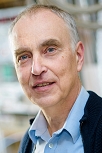Prof. Dr. Wolfram Sander

Foto by Damian Gorczany
Curriculum Vitae
* 22.10.1954, German
Lehrstuhl für Organische Chemie II, Ruhr-Universität Bochum, 44780 Bochum
POSITIONS
| since July 2023 | Senior Professor, Ruhr-Universität Bochum |
| 2002 | Offer of a Chair of Organic Chemistry, Philipps-Universität Marburg, declined |
| 1993-2023 | Full Professor and Chair of Organic Chemistry, Ruhr-Universität Bochum |
| 1990 - 1993 | Associate Professor of Organic Chemistry, TU Braunschweig |
| 1995 - 1990 | Research Fellow, Institute of Organic Chemistry, Ruprecht-Karls-Universität Heidelberg |
| 1982 - 1984 | Post-Doctoral Researcher, Department of Chemistry and Biochemistry, University of California, Los Angeles |
EDUCATION
| 1989 | Habilitation in Organic Chemistry, Ruprecht-Karls-Universität Heidelberg |
| 1982 | Dr. rer. nat., Institute of Organic Chemistry, Ruprecht-Karls-Universität Heidelberg |
| 1978 | Diploma in Chemistry, Ruprecht-Karls-Universität Heidelberg |
SCIENTIFIC REWARDS / AWARDS
| 2024 | George C. Primentel Award for Advances in Matrix Isolation Spectroscopy |
| 2017 | Orville Chapman Lecture, UCLA |
| 2007 | Adolf-von-Baeyer Gold Medal of the German Chemicl Sociaty (GDCh) |
| 1990 | Award of a Karl-Winnacker Scholarship (Hoechst AG) |
| 1989 | Award of a Heisenberg Scholarship of the German Research Foundation (DFG) |
| 1988 | Karl Freudenberg Prize of the Academy of Science, Heidelberg |
| 1982 | Award of a Fedoy-Lynen Scholarship of the Alexander von Humboldt Foundation |
| 1978 | Viktor-Meyer Award of the Faculty of Chemistry, Ruprecht-Karsl-Universität Heidelberg |
FURTHER ACTIVITIES
| since 2015 | Associate Editor of the Journal of Organic Chemistry |
| since 2012 | Founding member and member of the executive board of RESOLV, Cluster of Excellence funded by the German Research Foundation (DFG) |
| 2012 - 2014 | Chairman, Department of Chemistry and Biochemistry |
| 2006 - 2009 | Member of the Advisory Board of the Beilstein Journal of Organic Chemistry |
| since 2005 | Member of the Advisory Board of the Journal of Physical Organic Chemistry |
| 2001 - 2009 | Chair of DECHEMA (German Association of Chemical Engeneers) committee "Kinetics and Reaction Mechanisms" |
| 2000 - 2009 | Member of the Supervisory Board of the Beilstein Institute of the Advancement of Science |
| 1998 - 2008 | Member of the Editorial Board of the European Journal of Organic Chemistry |
| 1997 - 2001 | Member of the Wiley-VCh Advisory Board |
| 1995 - 1997 | Chairman, Department of Chemistry and Biochemistry |
RECENT RESEARCH FIELDS:
High-Spin Molecules
Organic high-spin molecules such as polyradicals, polycarbenes, or polynitrenes can be utilized as building blocks for organic magnets. In our laboratory, molecules with six and more unpaired electrons (e. g.trinitrenes) were synthesized and characterized by matrix isolation IR, EPR, and UV-vis spectroscopy. By combining σ- and π-radical centers we synthesize challenging molecules with unusual spin topologies.
Solvent Control of Reactivity
Interactions of reactive intermediates and transition states with solvent molecules determine reactivity and product selectivity, in particular if charge separation is involved. Our group studies solvent interactions of open-shell molecules both by low-temperature and by time-resolved spectroscopy. We could demonstrate that single solvent molecules are able to switch the spin states of carbenes, and thus drastically change their reactivity. This work changed established paradigms on carbene reactivity.
Magnetic Bistability
The coexistence of molecules in different spin states is a largely unexplored phenomenon, contradicting common scientific expectation of rapid intersystem crossing between spin states. Using low-temperature techniques, we isolated carbenes which coexist in their singlet and triplet states. Our work allowed us to establish spin bistability as a general phenomenon, only depending on the singlet-triplet gap of carbenes. This gives us the unique opportunity not only to spectroscopically characterize the same carbene in its different spin states, but also to explore spin-specific reactions in detail.
Tunneling Reactions
Quantum mechanical tunneling (QMT) has been recognized as an important process contributing to chemical reactions. We discovered several reactions where heavier atoms such as carbon undergo QMT, and we study how QMT determines the rates as well as the product selectivities at low temperatures. Examples for tunneling reactions are ring-openings of strained cyclic compounds, insertions of carbenes into the OH bond, activation of dihydrogen, and the Cope rearrangement.
Reactive Intermediates
Much of our research is centered around reactive intermediates which we study using a variety of low-temperature and time-resolved techniques. Besides open-shell molecules, we investigate highly strained and antiaromatic molecules. The focus of our research lies on the reactivity of molecules which are difficult to access experimentally. Reactions include rearrangements, oxidations, hydrogenations, hydrogen- and halogen-bonding, proton and electron transfer, and others.

